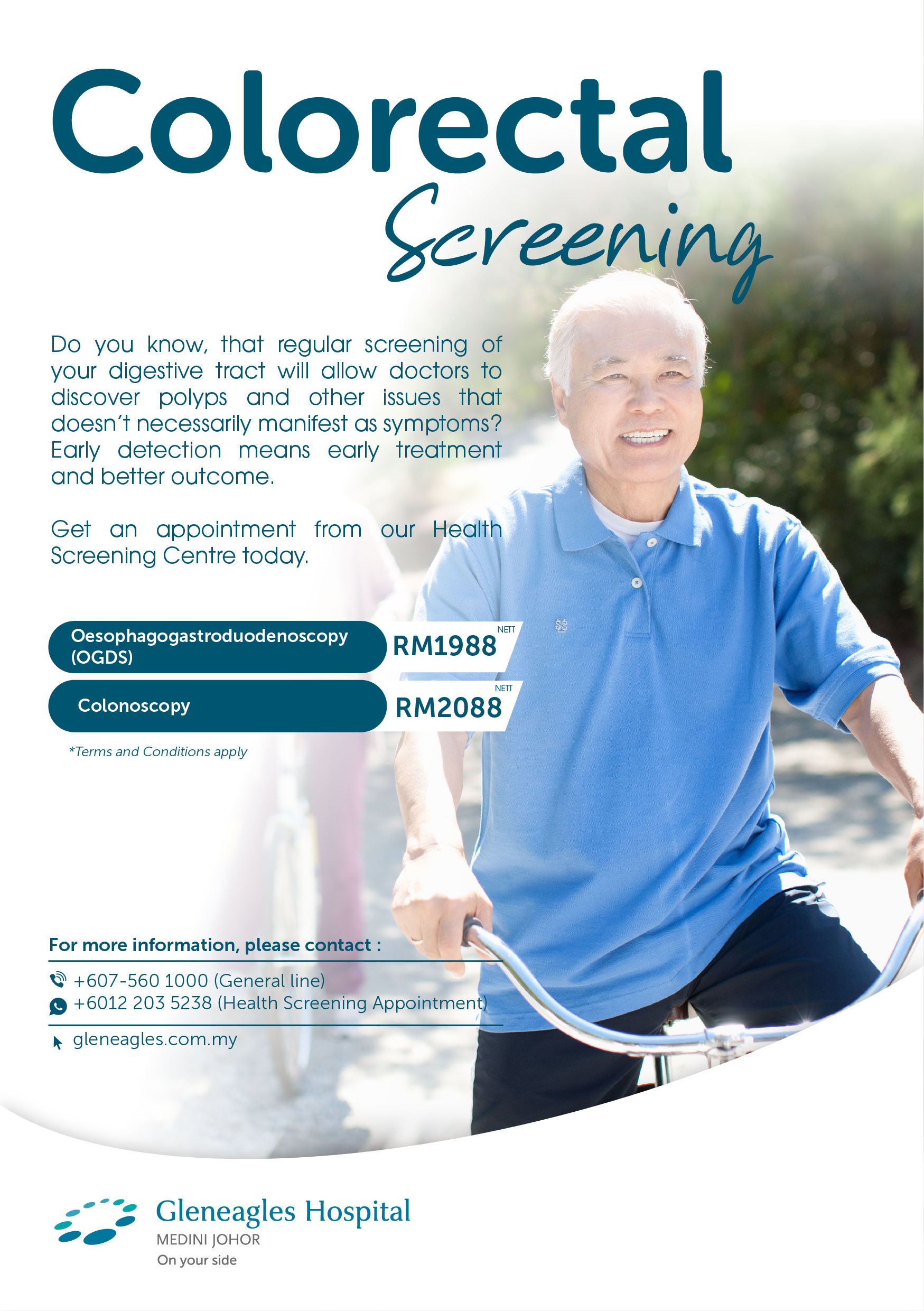Endoscopy
This procedure involves looking and examining the inside of a person’s body using an endoscope. Unlike other medical imaging devices, endoscopes are inserted directly into the body or organ. It can be used for investigative procedure for the gastrointestinal tract, rectum, and respiratory tract (nose and ear and throat), amongst others.
Gleneagles Johor’s Endoscopy Centre is equipped with modern equipment and technology, managed and run by certified specialists and nurses.
Overview
The Endoscopy Unit at Gleneagles Hospital Johor is a state-of-the-art facility that is staffed by Gastroenterologists, Surgeons, Respirologists and specialized endoscopy nurses.
We provide screening procedures for diagnostic and preventative purposes.
Services Offered:
The endoscopic procedure is performed for diagnosis and/or treatment of various digestive conditions such as polyps, cancers, ulcers, bile duct and pancreatic stones, cysts of the pancreas and other non-cancerous tumours. It is applied to examine abnormalities in the oesophagus, stomach, small and large intestines, liver, pancreas and gall bladder.
Our Endoscopy Unit provides a comprehensive range of endoscopy services using modern technology to cater to patients with various medical and surgical needs.
Our doctors and nurses work together to help you manage the condition in order to achieve better health and well-being.
Gastroscopy
This procedure allows us to examine the upper digestive system including the oesophagus, stomach and first part of the duodenum (small intestine). It is used to investigate and diagnose persistent symptoms such as heartburn, abdominal pain, vomiting or bleeding from the digestive tract.
Colonoscopy
This procedure allows the direct visualisation of the colon (large intestine). It is used to investigate conditions related to the change in bowel habits. It is a commonly recommended procedure for colon cancer screening.
Endoscopic Retrograde Cholangio-pancreatography (ERCP)
This procedure allows us to diagnose and treat disorders of the bile and pancreatic ducts. We can safely diagnose and remove stones from the bile ducts causing jaundice and remove stones from the pancreas.
Bronchoscopy
This procedure allows the direct visualisation of air passages leading to the lung. It is used to evaluate symptoms such as coughing of blood, noisy or abnormal breathing, or to determine the cause of an abnormal chest X-ray.
Cystoscopy
This procedure allows us to examine the urinary system including of the bladder and urethra (the tube that carries urine out of your body). It is used to investigate certain urological conditions such as enlargement of the prostate gland and other abnormal findings in the urine.
GETTING READY FOR YOUR PROCEDURE
On the day of your procedure please plan to arrive 1 hour before your scheduled procedure to register and be prepared for your procedure. Allocate 1-3 hours at the hospital for the procedure.
PREPARING FOR SEDATION
You may have sedation during the procedure. It is advisable that you have someone to accompany you home. If you do not have someone to accompany you home, your procedure will be done without sedation or will be rescheduled.
EATING AND DRINKING:
Not to eat or drink at least 8 hours before the procedure.
In addition to not eating or drinking you may need to do a bowel prep before your procedure. Please confirm with your doctor prior to your procedure and follow the recommendation by your doctor.
MEDICATIONS
Your doctor may want you to stop taking certain medications 4 to 5 days before the procedure. Contact your doctor at least 1 week before to ask about your medications.
Prepare a list of the current medications you take and any allergies you have. Include herbal products and over-the-counter medications on your list. You can ask your pharmacist to print a copy of your medication record for you. Bring this list or your medications to your procedure.
VALUABLES
We ask that you do not bring any valuables with you as the hospital cannot be responsible for lost or stolen personal items.
AFTER YOUR PROCEDURE
Do not drive, operate machinery, drink alcohol, or make major decisions for the next 24 hours after the procedure. You can resume work and your normal activities the next day.
If you had sedation, you MUST have someone to accompany you home. Please ensure you have appropriate transportation arranged.
If you have any questions, please seek clarification from your doctor who order this test.
The doctor may or may not tell you about the results after the procedure. You may be required to return to the hospital and get another consultation session with your doctor.

 +607 560 1000
+607 560 1000
 +607 560 1111
+607 560 1111



